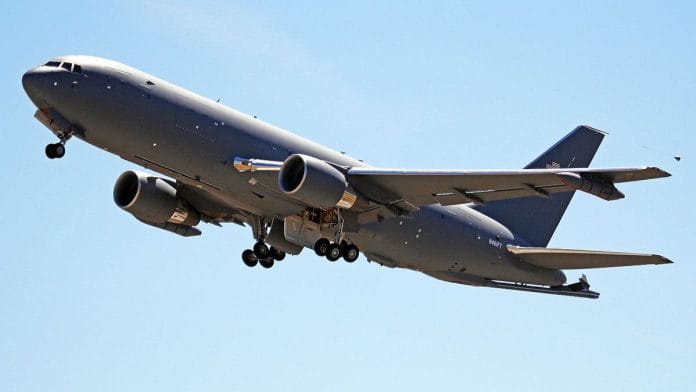New Delhi: The US Air Force has grounded all of its KC-46 tanker aircraft, delivered by Boeing under the ‘Pegasus Program’, after cracks were discovered on two of four new, ready-for-delivery jets and is set to inspect all 89 planes now.
The KC-46A Pegasus is a tanker aircraft designed to provide aerial refuelling and airlift support to the US military.
According to a report in The War Zone, the cracks on the two new aircraft were not on “any flight surfaces or hinges, but rather on the primary or secondary structures”. The US Air Force, it added, will not use any of the planes until it has finished looking into the issue.
According to military experts, the latest issues with the aircraft could result in reduced flight durations and limit the distance travelled. Such aircraft could have a strategic impact, particularly on missions requiring midair refuelling while travelling long distances or when grounding becomes necessary.
Before the deliveries even began, problems had started plaguing the ‘Pegasus Program’. The US Government Accountability Office, a congressional watchdog, has indicated that the US Air Force will not receive the fully corrected KC-46A until 2026 at the earliest, according to a report by Newsweek.
To address the issues with the KC-46A Pegasus, Boeing has already outlined the steps that it is now taking to improve the aircraft.
“We are working closely with the customer (the US Air Force) to assess a potential issue on KC-46A aircraft and to mitigate any potential impact to the fleet and in-production airplanes,” read a statement by Boeing.
Boeing is integrating a new version of the Remote Vision System, which boom operators use to guide the refuelling process. The decision to overhaul the RVS came after the original system was found potentially dangerous and causing physical discomfort or illness among operators.
Many problems, losses
The ‘Pegasus Program’ was years behind schedule, with the US Air Force receiving the first KC-46A in January 2019. Afterwards, issues with the remote vision and refuelling boom systems prevented the KC-46A from reaching its full operational potential.
In March 2024, the KC-46A programme experienced a two-month delay in delivering a new aircraft due to the discovery of a broken part associated with the boom, The War Zone reported.
A critical fiscal year 2024 report from the Director of Operational Test and Evaluation revealed that the KC-46A failed to meet several suitability metrics, as well. The report stated the aircraft operational availability—with a threshold of ≥80 percent—and mission-capable rate—with a threshold of ≥90 percent—declined slightly during FY24, falling well below the required standards.
The problems affecting the ‘Pegasus Program’ have led to a roughly $800 million loss for Boeing.
The company linked part of this loss to a September strike by its Seattle-area machinist union, which disrupted production for seven weeks, halting the assembly of jetliners such as the twin-aisle 767—the base model for the KC-46—as reported by Breaking Defense.
Since the KC-46 fixed-price contract, Boeing has faced billions in losses. The setbacks to the ‘Pegasus Program’ have delayed the US Air Force from replacing the ageing KC-135 tanker fleet with the KC-46. The KC-135 has been in service since the late 1950s under the Eisenhower administration. Another challenge is that the US Air Force retired the last KC-10 Extender refuelling aircraft in September 2024.
Chandan Singh is an intern with ThePrint
(Edited by Madhurita Goswami)
Also Read: Miss America 2024 Madison Marsh is the first active-duty US Air Force officer to win the title






